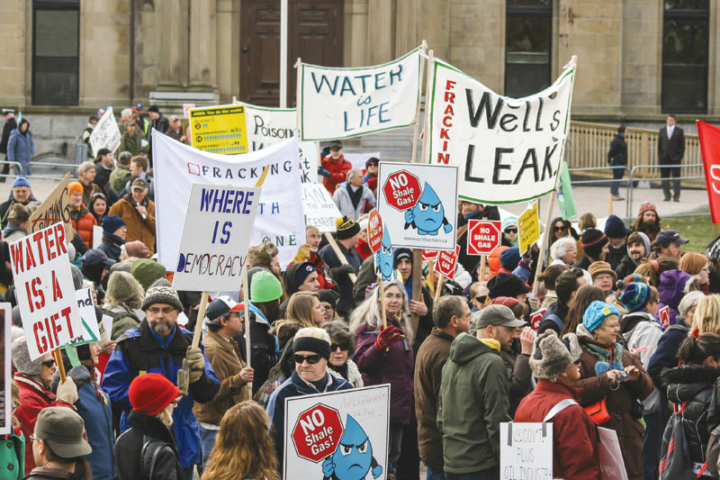Commentary | Jim Emberger
Everyday, business ads promote the idea that wise business leaders make decisions based on solid data.
Premier Higgs likes to project the image of an experienced business leader, but his current effort to resurrect shale gas reveals that he more closely embodies his other reputation as a, “Data, my ass,” decision maker.
There is unequivocal data in the latest report from the International Panel on Climate Change, which shows that we cannot develop any new fossil fuel source if we hope to escape the dire consequences of a warming climate.
This data was researched by virtually the entire global community of climate scientists and institutions.
Knowing this, any suggestion to now begin a shale gas industry, (designed to last for decades) directly contradicts the data, and constitutes an intellectual, not to mention moral, failure.
Data show that: the fossil fuel industry is Canada’s leading source of greenhouse gas (GHG) pollution; the global warming effect of methane (natural gas) is 86 times more powerful than carbon dioxide over 20 years; and methane is the fastest-growing GHG.
Fracking produces a lot of carbon dioxide by burning huge amounts of fossil fuels. This, plus well-documented leakage of methane from the entire shale gas lifecycle, mean that fracked gas may be as bad as burning coal to generate electricity.
Thus, Higgs’s idea of switching the Belledune power plant from coal to fracked gas to lower provincial GHGs directly denies all the data. Even the International Energy Agency, once a champion of shale gas, acknowledges that gas can no longer be a transition fuel.
Data from non-climate fracking research overwhelmingly supports continuing our current moratorium. Fracking’s serious threats to health are growing in type and number, as the “safe distance” from wells grows longer.
Fracking pollutes both ground and drinking water. It produces copious air pollution. Ever-longer wells use huge and growing amounts of freshwater, and produce correspondingly more toxic wastewater, for which no safe, affordable method of disposal exists. It causes earthquakes.
In sum, the data show that none of the standards for lifting the moratorium can be met.
Higgs denies historical data, too; believing he can bring back shale gas by simply convincing First Nations to make a deal.
While the RCMP raid in Elsipogtog was dramatic and memorable, it was just one event in years of opposition to fracking by a historic alliance of First Nations, anglophones and francophones across the province, which included unions, public health, physician and nursing groups, religious organizations, community groups, environmentalists, and groups formed just to oppose fracking.
Thousands of non-Indigenous people signed petitions, demonstrated, attended educational meetings, and participated in civil disobedience, risking arrest along with their Indigenous allies. They filed a lawsuit against the Alward government, and later voted that government out.
This overwhelming demonstration that there is no social license for fracking in the non-Indigenous community is more data that Higgs ignores.
Even his reprehensible attempt to bribe First Nations with promises of $1.6 billion in shale gas money over 20 years woefully lacks supportive economic data.
No one knows how much N.B. gas is economically recoverable, and the past year has seen record volatility in gas prices. The gas market is shrinking through conservation, a renewable energy boom, and price volatility.
Promises based on gas price and market predictions 20 years out, are strictly crystal ball gazing. The timeframe matters, because governments typically give tax and royalty breaks to the industry to offset upfront investments. Little revenue is actually collected for many years.
A gas industry launched today may be unused in 20 years if we address climate change; and if we don’t, then the climate, and our goose, will be well and truly cooked.
I don’t speak for Indigenous people, but any objective observer can see that their serious opposition to shale gas is rooted in age-old spiritual and cultural obligations to protect the water, the land and nature’s bounty. It is an ethos that also finds support in scientific data, and which we all would do well to adopt.
Higgs asks that they forsake that heritage in exchange for a fantasy deal, and ignore the real and continuing need to preserve the province, planet and our future.
Instead, wise leaders, following the dictates of solid data, should ask for an immediate, legislated, permanent ban on shale gas and fracking.
Jim Emberger is the spokesperson for the New Brunswick Anti-shale Gas Alliance
This article appeared in the New Brunswick Telegraph-Journal on Wednesday, March 24, 2023.

